| Listing 1 - 10 of 33 | << page >> |
Sort by
|

ISBN: 0231042264 Year: 1978 Publisher: New York Columbia University Press
Abstract | Keywords | Export | Availability | Bookmark
 Loading...
Loading...Choose an application
- Reference Manager
- EndNote
- RefWorks (Direct export to RefWorks)
Baraka, Imamu Amiri --- Black nationalism --- Nationalisme noir --- Zwarten--Nationalisme --- African Americans in literature. --- Modernism (Literature) --- Baraka, Imamu Amiri, --- Criticism and interpretation. --- Black separatism --- Nationalism -- Blacks --- Nationalism [Black ] --- Nationalisme -- Noirs --- Noirs -- Nationalisme --- Separatism [Black ] --- Séparatisme noir --- Zwarten -- Nationalisme --- Criticism and interpretation
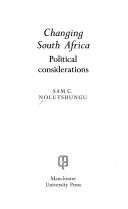
ISBN: 0719008603 0719008859 Year: 1982 Publisher: Manchester : Manchester University Press,
Abstract | Keywords | Export | Availability | Bookmark
 Loading...
Loading...Choose an application
- Reference Manager
- EndNote
- RefWorks (Direct export to RefWorks)
Blacks --- Black nationalism --- Politics and government. --- Economic conditions. --- South Africa --- Politics and government --- Race relations. --- Black separatism --- Nationalism --- Nationalism, Black --- Separatism, Black --- Black power --- Economic conditions --- Race identity --- Africa, South --- Race question --- Black people --- Black persons --- Negroes --- Ethnology
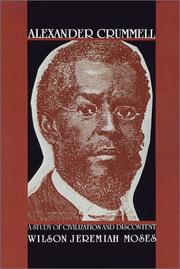
ISBN: 1280449683 0195364082 9780195364088 0195050967 9780195050967 Year: 1989 Publisher: Oxford Oxford University Press, USA
Abstract | Keywords | Export | Availability | Bookmark
 Loading...
Loading...Choose an application
- Reference Manager
- EndNote
- RefWorks (Direct export to RefWorks)
This remarkable biography, based on much new information, examines the life and times of one of the most prominent African-American intellectuals of the nineteenth century. Born in New York in 1819, Alexander Crummell was educated at Queen's College, Cambridge, after being denied admission to Yale University and the Episcopal Seminary on purely racial grounds. In 1853, steeped in the classical tradition and modern political theory, he went to the Republic of Liberia as an Episcopal missionary, but was forced to flee to Sierra Leone in 1872, having barely survived republican Africa's first coup
African Americans --- Black nationalism --- Pan-Africanism --- African relations --- African cooperation --- Regionalism (International organization) --- Black separatism --- Nationalism --- Nationalism, Black --- Separatism, Black --- Black power --- Blacks --- History --- Politics and government --- Race identity --- Crummell, Alexander, --- Crummell, Alex. --- Black people
Book
ISBN: 0252099559 9780252099557 9780252041006 0252041003 9780252082498 0252082494 Year: 2017 Publisher: Urbana Chicago Springfield University of Illinois Press
Abstract | Keywords | Export | Availability | Bookmark
 Loading...
Loading...Choose an application
- Reference Manager
- EndNote
- RefWorks (Direct export to RefWorks)
A 2008 cover of The New Yorker featured a much-discussed Black Power parody of Michelle and Barack Obama. The image put a spotlight on how easy it is to flatten the Black Power movement as we imagine new types of blackness. Margo Natalie Crawford argues that we have misread the Black Arts Movement's call for blackness. We have failed to see the movement's anticipation of the 'new black' and 'post-black.' 'Black Post-Blackness' compares the black avant-garde of the 1960s and 1970s Black Arts Movement with the most innovative spins of 21st century black aesthetics. Crawford zooms in on the 1970s second wave of the Black Arts Movement and shows the connections between this final wave of the Black Arts movement and the early years of 21st century black aesthetics.
Black nationalism. --- Black separatism --- Nationalism --- Nationalism, Black --- Separatism, Black --- Black power --- Blacks --- Politics and government --- Race identity --- Black people --- African-American literature and culture --- Expanding and exploding the boundaries

ISBN: 0822329735 0822329824 9780822329824 9780822329732 9786613064073 1283064073 0822383888 Year: 2002 Publisher: Durham, NC : Duke University Press,
Abstract | Keywords | Export | Availability | Bookmark
 Loading...
Loading...Choose an application
- Reference Manager
- EndNote
- RefWorks (Direct export to RefWorks)
Black Nationalism in the New World combines geography, political economy, and subaltern studies in readings of noncanonical literary works, which in turn illuminate debates over African-American and West Indian culture, identity, and politics. In addition to Martin Delany's Blake; or The Huts of America, Carr focuses on Crown Jewel, R. A. C. de Boissière's novel of the Trinidadian revolt against British rule; Pauline Hopkins's Contending Forces; Wilson Harris's Guyana Quartet; the writings of the Oakland Black Panthers-- particularly Huey Newton, Bobby Seale, and Eldridge Cleaver; the gay novella Just Being Guys Together; and Lionheart Gal, a collection of patois testimonials assembled by Sistren, a radical Jamaican women's theater group active in the 1980s.
Black nationalism --- African Americans --- Blacks --- Negroes --- Ethnology --- Black separatism --- Nationalism --- Nationalism, Black --- Separatism, Black --- Black power --- Negritude --- African American nationalism --- Race identity --- Politics and government --- Ethnic identity --- Black persons --- Black people --- Race identity. --- NATIONALISME NOIR --- NOIRS AMERICAINS --- NOIRS --- ETATS-UNIS --- IDENTITE ETHNIQUE --- ANTILLES
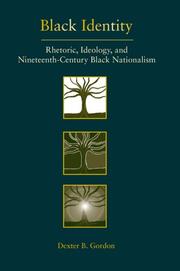
ISBN: 058549648X 9780585496481 0809324857 9780809324859 0809324865 9780809324866 Year: 2003 Publisher: Carbondale : Southern Illinois University Press,
Abstract | Keywords | Export | Availability | Bookmark
 Loading...
Loading...Choose an application
- Reference Manager
- EndNote
- RefWorks (Direct export to RefWorks)
"Dexter B. Gordon's Black Identity: Rhetoric, Ideology, and Nineteenth-Century Black Nationalism explores the problem of racial alienation and the importance of rhetoric in the formation of black identity in the United States. Faced with alienation and disenfranchisement as a part of their daily experience, African Americans developed collective practices of empowerment that cohere as a constitutive rhetoric of black ideology. Exploring the origins of that rhetoric, Gordon reveals how the ideology of black nationalism functions in contemporary African American political discourse."--Jacket.
Black nationalism --- African Americans --- Rhetoric --- English language --- Gender & Ethnic Studies --- Social Sciences --- Ethnic & Race Studies --- Afro-Americans --- Black Americans --- Colored people (United States) --- Negroes --- Africans --- Ethnology --- Blacks --- Black separatism --- Nationalism --- Nationalism, Black --- Separatism, Black --- Black power --- Language and languages --- Speaking --- Authorship --- Expression --- Literary style --- History --- Race identity --- Communication. --- Political aspects --- Rhetoric. --- Communication --- Politics and government --- Black people --- Germanic languages --- Political aspects.
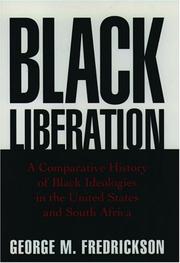
ISBN: 1280453222 0198022352 1423741307 1602561540 9781423741305 9780195109788 0195109783 9781280453229 019505749X 9780195057492 0197711820 Year: 1995 Publisher: New York : Oxford University Press,
Abstract | Keywords | Export | Availability | Bookmark
 Loading...
Loading...Choose an application
- Reference Manager
- EndNote
- RefWorks (Direct export to RefWorks)
Focusing on the efforts of African Americans and South African blacks to combat white domination in society, this study begins in the 1860s, following the emancipation of slaves after the Civil War, and ends with the conclusion of apartheid in South Africa.
Civil rights movements --- African Americans --- Blacks --- Pan-Africanism --- Black nationalism --- Black separatism --- Nationalism --- Nationalism, Black --- Separatism, Black --- Black power --- Civil liberation movements --- Liberation movements (Civil rights) --- Protest movements (Civil rights) --- Human rights movements --- History. --- Politics and government. --- Politics and government --- Race identity --- United States --- South Africa --- Race relations. --- Race question --- Black people --- Black persons --- Negroes --- Ethnology
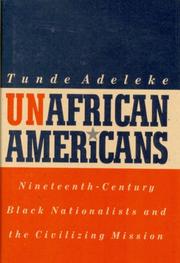
ISBN: 0813157536 0813170001 9780813170008 081312056X 9780813120560 0813189667 Year: 1998 Publisher: Lexington University Press of Kentucky
Abstract | Keywords | Export | Availability | Bookmark
 Loading...
Loading...Choose an application
- Reference Manager
- EndNote
- RefWorks (Direct export to RefWorks)
Though many scholars will acknowledge the Anglo-Saxon character of black American nationalism, few have dealt with the imperialistic ramifications of this connection. Now, Nigerian-born scholar Tunde Adeleke reexamines nineteenth-century black American nationalism, finding not only that it embodied the racist and paternalistic values of Euro-American culture but also that nationalism played an active role in justifying Europe's intrusion into Africa.Adeleke looks at the life and work of Martin Delany, Alexander Crummell, and Harry McNeal Turner, demonstrating that as supporters of the mission
Pan-Africanism --- African Americans --- Black nationalism --- African relations --- African cooperation --- Regionalism (International organization) --- Afro-Americans --- Black Americans --- Colored people (United States) --- Negroes --- Africans --- Ethnology --- Blacks --- Black separatism --- Nationalism --- Nationalism, Black --- Separatism, Black --- Black power --- History --- Relations with Africans --- Politics and government --- Race identity --- United States --- 19th century --- Imperialism --- Black people
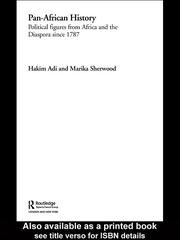
ISBN: 1134689330 0203419855 1280071281 0203417801 9780203417805 9780203419267 020341926X 9781280071287 9780415173520 0415173523 9780415173537 0415173531 9781134689286 9781134689323 9781134689330 1134689322 Year: 2003 Publisher: London: Routledge,
Abstract | Keywords | Export | Availability | Bookmark
 Loading...
Loading...Choose an application
- Reference Manager
- EndNote
- RefWorks (Direct export to RefWorks)
Brings together Pan-Africanist thinkers and activists from the Anglophone and Francophone worlds of he last two-hundred years.
Pan-Africanism --- Black nationalism --- Nationalists --- African Americans --- Nationalism --- Black separatism --- Nationalism, Black --- Separatism, Black --- Black power --- Blacks --- History. --- Politics and government --- Race identity --- Panafricanisme --- --Nationalisme noir --- --Nationaliste --- --Afrique --- --Histoire --- --Biographie --- --dictionnaire biographique --- --History --- History --- Black people --- Pan-Africanism - History --- Black nationalism - History --- Nationalists - Africa - Biography --- African Americans - Biography --- Nationalisme noir --- Afrique --- Histoire --- Biographie
Book
ISBN: 0820349844 9780820349848 9780820335124 0820335126 0820354767 Year: 2016 Publisher: Athens University of Georgia Press
Abstract | Keywords | Export | Availability | Bookmark
 Loading...
Loading...Choose an application
- Reference Manager
- EndNote
- RefWorks (Direct export to RefWorks)
""New Negro Politics in the Jim Crow South" narrates the story of New Negro political culture from the perspective of the black South. It details how the development and maturation of New Negro politics and thought was shaped not only by New York-based intellectuals and revolutionary transformations in Europe, but also by people, ideas, and organizations rooted in the South. Harold's aim is not to devalue the importance of the North or Europe during this period of black political and cultural renaissance. Instead, her probe into some of the critical events and developments below the Mason-Dixon-Line sharpen our vision of how many black activists, along with particular segments of the white American Left, arrived at certain theoretical conclusions and political choices regarding the politics of race, challenges to capitalist political economy, and alternative visions of nation. The book considers southern black political movements during a period dominated by the study of the urban North (and specifically the Harlem Renaissance). Focusing on Garveyites, A. Philip Randolph's militant unionists, and black anti-imperialist protest groups, among others, Harold argues that the South was a largely overlooked "incubator of black protest activity" between World War I and the Great Depression."--Provided by publisher.
African Americans --- Black nationalism --- Labor movement --- Civil rights movements --- African American intellectuals --- Black separatism --- Nationalism --- Nationalism, Black --- Separatism, Black --- Black power --- Blacks --- Labor and laboring classes --- Social movements --- Afro-Americans --- Black Americans --- Colored people (United States) --- Negroes --- Africans --- Ethnology --- Intellectual life. --- History --- Race identity --- Politics and government --- Southern States --- Race relations --- 20th century --- Intellectual life --- 1865-1950 --- Black people
| Listing 1 - 10 of 33 | << page >> |
Sort by
|

 Search
Search Feedback
Feedback About UniCat
About UniCat  Help
Help News
News